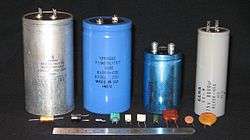コンデンサ
Japanese

コンデンサ (kondensa): various electronic capacitors.
Alternative forms
Etymology
Borrowed from English condenser.[1][2][3]
Originally spelled コンデンサー (kondensā). As with other imported words ending in long "ā", the final vowel has shortened in more common usage, resulting in the current spelling.
Noun
コンデンサ (rōmaji kondensa)
- (electronics) a capacitor
- Though called capacitors in modern English, these electronic devices were originally called condensers from as far back as 1782. The Japanese term is based on this older terminology.
- (optics) an optical condenser, such as a lens or mirror
- (mechanics, physics) a condenser, a device or unit used to condense vapor into liquid
Usage notes
Japanese has also borrowed the modern English term capacitor for the electronic component, as キャパシタ (kyapashita). However, the term コンデンサ (kondensa) is used much more commonly.
Synonyms
References
- 1988, 国語大辞典(新装版) (Kokugo Dai Jiten, Revised Edition) (in Japanese), Tōkyō: Shogakukan
- 2006, 大辞林 (Daijirin), Third Edition (in Japanese), Tōkyō: Sanseidō, →ISBN
- 1995, 大辞泉 (Daijisen) (in Japanese), Tōkyō: Shogakukan, →ISBN
This article is issued from
Wiktionary.
The text is licensed under Creative
Commons - Attribution - Sharealike.
Additional terms may apply for the media files.